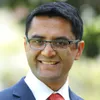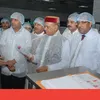How this Mumbai entrepreneur built a Rs 1,000 Cr medical devices business from just Rs 1 lakh loan
Started in 1979 by Suresh Vazirani, Transasia BioMedicals offers IVD products and solutions in biochemistry, hematology, coagulation, immunology, and many more. Here's Suresh's story.
Suresh Vazirani was just 21 when he sacrificed a corporate career to work for social causes inspired by the Sarvodaya Movement. The movement comprised the collective efforts of Mahatma Gandhi's followers who worked to create the democratic society the freedom activist envisioned.
A young Suresh was also actively associated with Navnirman Andolan, a 1974 socio-political movement started in Gujarat which fought against economic crisis and corruption.
One day, an incident at a hospital set Suresh on an unexpected path to becoming a healthcare entrepreneur when Navnirman Andolan's Bihar leader Jayaprakash Narayan suffered kidney failure, and he was admitted to a hospital.
Suresh tells SMBStory:
"At the hospital, the imported dialysis machine broke down and the service engineer was unavailable. Since I was a graduate in electrical engineering, I worked on the machine and made it functional at the right moment."
This incident made him think of the lives lost each day due to a lack of technical service for medical devices. He felt the creation of an affordable and easily-accessible medical technology provider was the need of the hour.
"The creation of such an organisation was more of a clarion call for service to society rather than the object of a business enterprise," he explains, adding, "I was already 29, and looking at something to devote my life to, I developed a conviction of improving the healthcare in India thus started Transasia BioMedicals in Mumbai in 1979."

Suresh Vazirani, Founder, Chairman and Managing Director, Transasia BioMedicals
Suresh says he started In Vitro Diagnostics (IVD) company Transasia with Rs 250 from his own pocket and Rs 1 lakh which he borrowed from a friend.
The funds went into starting operations as the distributor for a Japanese automated cell counter machines. By the early 1990s, Suresh recognised the need for indigenous manufacturing and set up his own R&D and production facilities to manufacture medical equipment such as blood analysers.
Over the years, Transasia has grown into a Rs 1,000 crore company which offers products and solutions in biochemistry, hematology, coagulation, ESR, immunology, urinalysis, critical care, diabetes management, microbiology and molecular diagnostics.
"One test is conducted on a Transasia device every two seconds. Every year, more than 150 crore blood tests are done on our equipment," Suresh adds.
In an exclusive interaction with SMBStory, Suresh, who is Founder, Chairman and Managing Director at Transasia BioMedicals, shares his recipe for succeeding in an IVD market likely to exceed $1.8 billion by 2025.
Edited excerpts of the interview:
SMBStory: What is Transasia's business model? What are some of the unique business strategies?
Suresh Vazirani: Our target audience is pathologists, clinicians, lab technologists, and technicians. Transasia follows a simple strategy: AIM - Affordable, Innovative and Make in India products. We pool in our latest technologies from our global subsidiaries and manufacture in India in order to offer customised, low cost solutions. This way, we are able to meet the diagnostic needs for affordable, quality products in India and the global markets.
By focusing on customisation of products, commitment to after-sales services and quality, we are implementing a niche differentiation strategy in a somewhat fragmented marketplace. We also regularly conduct continuing educational programs for our customers to keep them updated with the latest technological advancements. We regularly provide our customers with clinical data through our weekly scientific and diagnostic updates that further advocate our technologies.
We also use digital platforms for promotions and also as an effective mechanism to gather customer feedback. Our customers can log in their feedback on our online portal, and it is then attended to by our sales team, even remotely if needed, in the shortest time possible.

Transasia medical diagnostics devices in use
SMBS: How is the company committed to IVD?
SV: We started with after-sales service of a Japanese hematology analyser and soon forayed into indigenous manufacturing of clinical chemistry analysers. India is a vast country with varied demographies, and thus, varied healthcare needs. We realised this and started acquiring companies globally that are specialising in different segments. This way, we have been able to leverage the latest technology and expertise from our global subsidiaries to manufacture state-of-the-art products in India, across different segments.
Further, 70 percent of the population has never got their blood tested. And our aim is to reach out to this 70 percent population through our products and solutions. Majority of the labs in India cannot afford advanced equipment. Rather than supplying products of the highest technology or with the most sophisticated automation, our portfolio is tailored to its target markets.
Transasia offers quality, affordable solutions by adopting cutting-edge technology from our European and Indian R&D centers and customising it. This enables us to provide equipment that is more affordable and reduce the operational expenses compared to imported equipment.

A Transasia R&D centre
SMBS: What is unique about your medical devices?
SV: Our latest breakthough products in different segments are the most-preferred among laboratories across the country.
Our complete range of clinical chemistry instruments and reagents are designed and developed in India. EM 200, our flagship instrument, has always been accepted as the most reliable product in its segment. Based on the expectations set forth by our pathologists and clinicians, we have been improvising this system for greater operational efficiency and cost effectiveness. In addition, in the last few years, we have expanded our reagent test menu to cater to a wide range of routine and specialised chemistries.
ECL 760, our latest coagulation analyser, employs technology from our Czech Republic subsidiary. It is three times faster and at a cost that is 30 percent lesser compared to imported analysers from leading global companies.
Further, years of research has resulted in Transasia being one of the first Indian companies and one of the very few across the globe to design and develop the 4th Generation HCV Ag + Ab Kit. This kit aids in early detection of HCV (Hepatitis C Virus), thereby reducing the risk of transmission by 41 percent.
We also have modern detection kits for dengue and malaria and automated instruments for diabetes detection and monitoring.

The Transasia BioMedicals factory in Daman
SMBS: What were the key milestones in your business journey?
SV: After starting as a distributor and then getting into manufacturing, we began exporting our products to the European market, having obtained CE certification. In early 2002, we acquired Erba Mannheim, our first global subsidiary, which has eventually grown to become the Transasia-Erba group. By 2006, Transasia was recognised as India’s largest IVD company and has retained that title till date.
Subsequently, almost every year, the Transasia-Erba group has been expanding its global footprints through its various acquisitions in Europe and USA. In the last eight years, the group has acquired 14 subsidiaries and forayed into almost every segment.
Amongst its latest acquisitions, Erba UK is a provider of state-of-the-art patented molecular diagnostic products for accurate and precise detection of diseases such as tuberculosis, HIV, respiratory diseases, dengue, malaria, etc. Further, Calbiotech USA is well-known to develop innovative products for the emerging markets.

Transasia's Calbiotech team in the USA
SMBS: What were the toughest moments you and the company faced?
SV: When I started off, I had no work experience. When Transasia was born, some Japanese friends from the MRA group gave us our first order for contract-marketing and after-sales service of an automated blood cell counter made in Japan. The machine weighed about 17 kgs. I remember carrying it from one hospital to the other, demonstrating how it works.
In a majority of the medical centres at that time, the standard equipment was a manual cell counter, often prone to errors. So for most physicians, the complete blood cell count was a crucial piece of data for diagnosis. However, they were skeptical about the accuracy of the instrument. Though such counters were already being used in Europe, many pathologists thought that they would not be accurate enough in the country, because there was too much interference from the dust in the air.
It took almost three years of continuous efforts to generate a favorable response. Over the next decade, Transasia began providing marketing and after-sales services for an increasing number of different instruments, manufactured by European and American companies.
In the 1980s and early 90s, the machines were relatively expensive and only big hospitals could afford it. The only solution was to start manufacturing them indigenously, which is what we began to do in 1991.

Transasia's Sikkim factory
SMBS: Who are the competitors and what are your plans for growing Transasia even further?
SV: I prefer not to use the word competition because I am sure my counterparts are also working towards the common goal of a healthier India. That being said, 70 percent of the medical equipment in India is imported. So what Indian manufacturers collectively need to reinstate is the relaxation of certain policies to encourage manufacturing in India.
Our growth strategy in the next three years is based on a mix of domestic and international opportunities. The Indian healthcare industry has seen an upward growth trend in the last 5-10 years and diagnostics is an integral sector contributing to the growth. We wish to ride this wave. We will expand in the existing product range and venture deeper into other segments.
Transasia is also developing low-cost tests that will detect blood contamination with 100 percent accuracy.
We are also venturing into chemiluminescence immunoassay products, molecular diagnostic products for detection of diseases such as tuberculosis, HIV, respiratory diseases, dengue, malaria, and some new technologies such as point-of-care testing and cancer and hemoglobinopathy markers.
(Edited by: Palak Agarwal)









